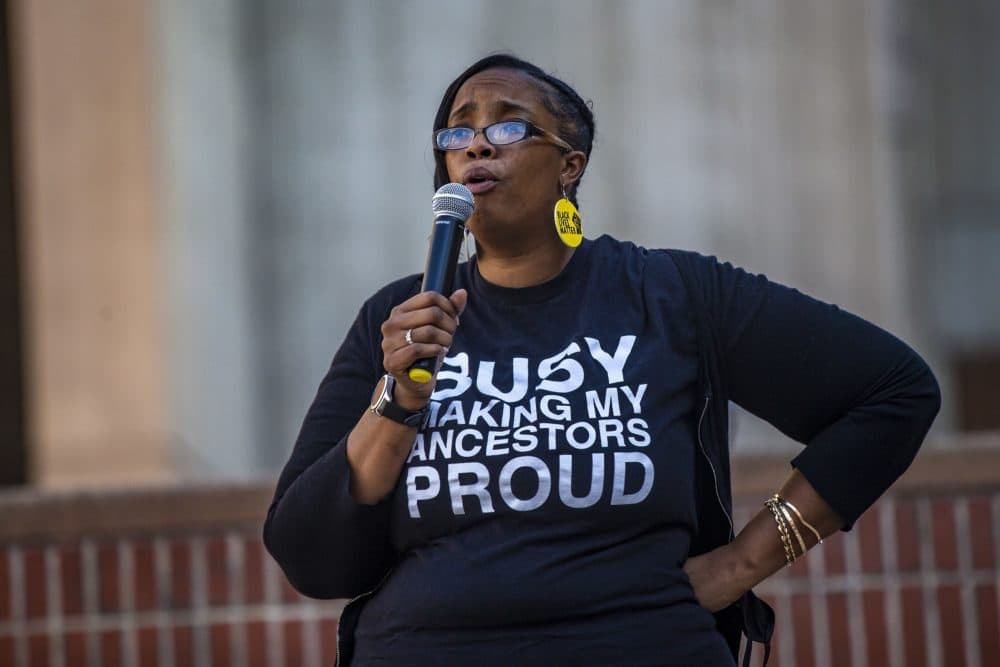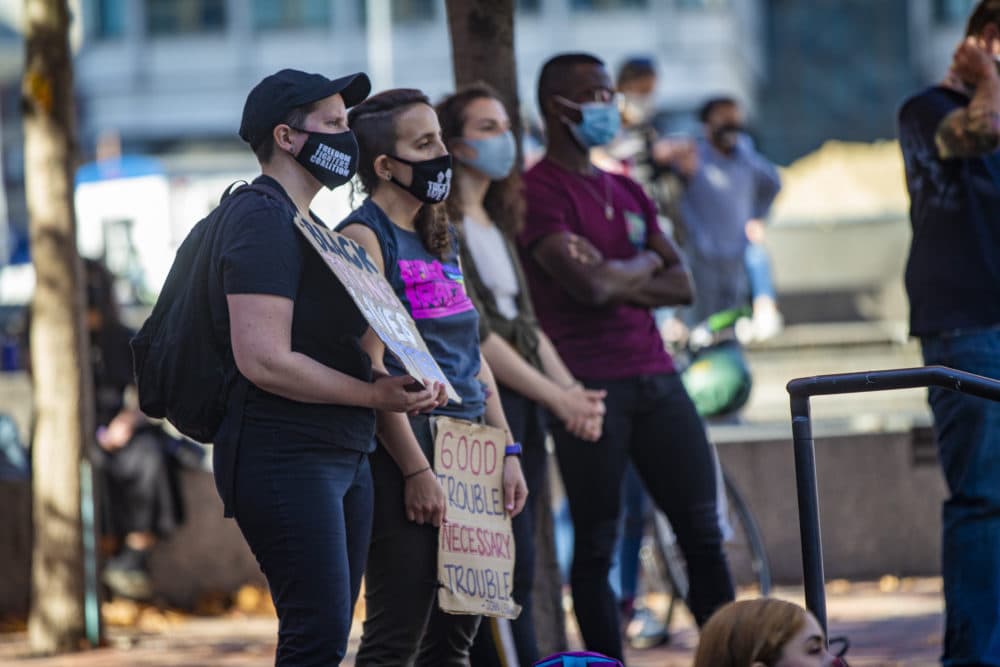Advertisement
'Just The Beginning': For Boston Activists, Harris' Election Sparks Joy, Tempered By Determination

On Saturday night, when Vice President-Elect Kamala Harris gave a victory speech to the nation alongside Joe Biden, Boston City Council President Kim Janey said she got emotional as she watched with her granddaughter.
"I got teary-eyed as I sat with my granddaughter and I thought of all the little girls all over the country watching history unfold right before their eyes," Janey said in Boston on Sunday morning.
Harris, the daughter of Indian and Jamaican immigrants, is not only the first woman to be elected to the position, she is also the first Black woman and the first South Asian woman who will hold the office. Janey, who is Black, said Harris' election sends a message to every little girl watching "that this is a country of possibilities."
But Janey was quick to add a caveat: "This country cannot solve systemic racism in one election cycle," she said. "There's no magic pill. There's no quick fix. And we — and when I say we, I mean all of us standing here, I mean everyone watching — we must do the work."
Janey was not the only local leader who felt compelled to commemorate Harris' win with this two-pronged public message: While this election is a major cause for celebration, it's only a minor step toward achieving racial justice for all.
"This country can not solve systemic racism in one election cycle. There's no magic pill. There's no quick fix."
Boston City Council President Kim Janey
Later that morning, during a rally at Boston's City Hall Plaza dubbed "What this Win Means for Black Lives," the mood was a similar mix of joy and sobriety. As upbeat tunes pumped from a pair loudspeakers, a crowd of about 70 people of different races and ages listened to community advocates and activists who said they felt inspired by the progress that Harris' election represents, but who also cautioned against complacency.
When the organizer, Monica Cannon-Grant, took the microphone, her message toggled back and forth between celebration and determination.
"Quite often we talk about how so many administrations and organizations don't have Black and brown people in their top tier," said Cannon-Grant, who also heads the organization Violence in Boston. "And we now have a Black woman, who is of Asian descent, second in command of this country.

"I think that we can hold the fact that a woman of color is occupying the vice president's seat, and continue to mobilize and activate in communities of color across this country about criminal justice reform and hold them accountable."
When it comes to criminal justice, Harris has billed herself as a progressive. But her critics say her record from her years as a California prosecutor tell a different story. As San Francisco's district attorney, Harris supported increasing the cost of cash bail. As attorney general of California, she resisted calls to investigate certain police shootings and opposed a law that would have set forth statewide requirements for police body cameras.
Cannon-Grant told the crowd that Harris' identity as a Black woman doesn't erase her role in a system shaped by racial prejudice.
"It doesn't mean that the protest stops," Cannon-Grant said. "It doesn't mean the mobilization stops, it just means she's on the receiving end."
Advertisement
“This is not about celebrating ... the representation in and of itself,” Tanisha Sullivan, president of the NAACP Boston branch, told the crowd. “This doesn’t matter if the policies stay the same.”
Sullivan said there is still a need push for economic, environmental and educational justice, “and it sure as hell don’t matter if racial justice doesn’t come. So the policies that come out of this administration, I want to be clear — the bar is high.”
Abdi Ali, who was in the crowd listening, agreed, saying those who voted for Biden and Harris should keep in mind that both have problematic histories when it comes to policies that have hurt communities of color.
"Winning the election yesterday does not mean that we have to close our books," Ali said.
Biden, for his part, helped author the Violent Crime Control and Law Enforcement Act, a 1994 crime bill that many experts believe contributed to an era of mass incarceration in which Black men have disproportionately been arrested and imprisoned.
"It doesn't mean that the protest stops. It doesn't mean the mobilization stops, it just means she's on the receiving end."
Activist Monica Cannon-Grant
Ali, 31, said he wants to see Biden and Harris embrace a "Black agenda, a people-of-color agenda" that would include criminal justice reform, immigration reform, resources to fight the pandemic and economic justice for marginalized communities.
"When Black folks win social and civil rights issues, all folks benefit from that," he said, adding, "The work is just beginning."
Systemic racism, poverty — and the violence they lead to — still exist, Cannon-Grant said. But the elevation of a Black woman to the second-highest office in the land? That's progress.
"We're hurting," she told the crowd. "But we're going to be alright."
This segment aired on November 9, 2020.
